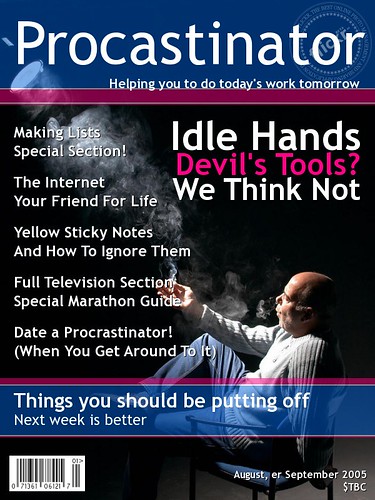There's one thing I've really missed since I've gotten kind of busy, traveling from bookstore to bookstore, and marveling that my book is here! and there! and sometimes even that other place, too!
What I've missed is the existential question. Or more specifically your responses.
I particularly missed the Existential Question when I came upon a rather strikingly named blog in which the blogger posed a question about how our parents' deepest beliefs formed--or provided a contrast to--our own.
Much as I was tempted to uproot the question and replant it here, I won't. But it did get me thinking about a lot of things. For instance:
1. How much fun it is to blame your parents for everything that's gone wrong in your life when you're young. (Did those callous people ever stop and think about how their actions were effecting your future mental health?)
And:
2. How much less fun it is when your children start doing it to you! (Don't they realize you did the best you could? After all, you're only human!)
Anyway, this question isn't about who's to blame. It's about who did something really great and why and what it is.
So here's the question: What's the one thing your parents did absolutely right in raising you?
You do not need to leave your room. Remain sitting at your table and listen. Do not even listen, simply wait, be quiet, still and solitary. The world will freely offer itself to you to be unmasked, it has no choice, it will roll in ecstasy at your feet. --FRANZ KAFKA
Wednesday, February 21, 2007
THE EXISTENTIAL QUESTION OF THE WEEK
Monday, February 19, 2007
ARE YOU AN ALI OR A JEANNE?
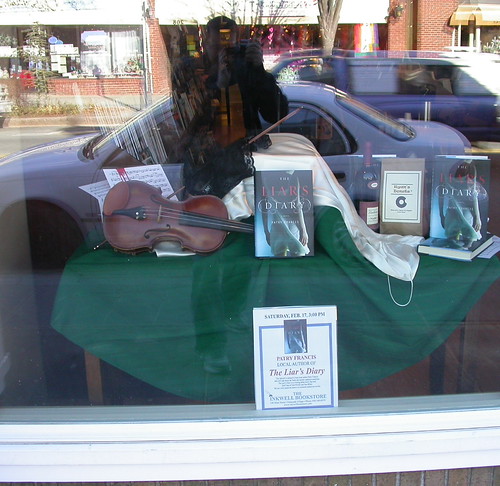
Perhaps one of the most interesting things that has happened to me since real people started
reading my novel was that I've heard very strong reactions to my two protagonists. Though both characters are flawed in their own way, most readers felt they could forgive--or perhaps even identify with--the plight and weaknesses of one character, but rarely both. By phone, in email, in person, and even in reviews, I've found that if one character was loved, the other was almost certain to be reviled.
It made me think that in many ways, both heroine and villain are very much in the eye of the beholder. What I particularly love about all this is the very direct way readers are engaging with these characters. They filtered their childhoods, their relationships with friends, lovers, spouses, and children through the prism of the novel, seeing light here, and shadow there. And how they felt about Ali and Jeanne depended on what their experiences had taught them, and how their inborn nature had formed them.
So just for fun, I decided to devise an Ali and Jeanne quiz:
1. What is your general pattern in paying bills?
a) Pay them promptly as soon as they arrive.
b) Put them in a pile with every intention of getting to them by the end of the month.
c) Treat yourself to an expensive bottle of wine, buy a lavish gift for a friend; then see what's
left over to apply to the bills.
2. Which best describes your attitude toward music?
a) Listen to it occasionally, especially in the car.
b) Love it, but I'm not as avid a listener as I once was.
c) Couldn't live a day without it.
3) How do you deal with problems in your relationships?
a) I would do almost anything to avoid conflict.
b) I choose my battles.
c) I believe in confronting issues immediately and directly.
4) Is sexual infidelity ever justified?
a) Never
b) In certain cases, such as when partners are incompatible, and staying together out of necessity.
c) If the passion is strong enough, it's almost a duty to say yes to it.
5) If suffering from insomnia, how would you court sleep?
a) With a good novel that took me out of myself, and a prescribed sleeping pill.
b) A glass of wine, a good book, and a lavish bubble bath.
c) I would stay awake and consume the night.
The answers will be found in the comment section.
Meanwhile, the first person to guess whether I was an a, b, or c wins a signed copy of The Liar's Diary. Thanks for playing!
Monday, February 12, 2007
10 WAYS TO BE BUSY ALL DAY AND NEVER ACCOMPLISH A THING!
Ever since I quit my waitressing job last fall, my life has been one that takes place largely in a little room. There I pace, and think; I listen to music, eat chocolate, inhale deeply, and exhale people who may or may not exist in one long sigh.
Though my characters are not based on anyone I've ever met, no one could ever convince me they're not REAL. How does that work? I have no idea. My job is not to question why, just to get back to the little room and listen.
Then, as I've been telling you on a daily basis, publication came, and I had to leave the little room. Put on eyeliner and lipstick and two socks that matched and go out and tell my story. Such as it is. I used to be a waitress; now I'm a writer. Or I was always a writer; I just pretended to be a waitress. Or maybe I'm pretending to be both...See what sitting in the little room alone too long will do to the brain?
Anyway, today was the first day in a whole week that I got to do what I do best:stay home and WRITE. So what did I do with my marvelous day? I took out the Procrastinator's Handbook, and personally tried every strategy.
What did I discover? If you want to kill time (a tragic metaphor if I've ever heard one) it's easier than you think.
10 WAYS
1. Sit around and think about every single person who's ever been mad at you or mean to you, and mentally go through the reasons that it's so unfair. (This could not just kill a day, but it can, and HAS, annihilated entire lifetimes.)
2. Use the internet to obsess over your place in the universe. The possibilities are endless. You can google yourself, go to Technorati and check your blog rating; and if you're a writer, there's always your Amazon rank...not that I know anything personally about these narcissistic activities.
3. Before you write a single word, or do a constructive thing, make sure you have the perfect beverage at your side, and that it is maintained at the exact temperature you prefer.
4. Think frequently about the chocolate, almonds, Danish waffle cookies, and leftover burritos in the kitchen. Maybe even get up and make sure they're still where you left them, and that they're just as delicious as they were yesterday.
5. Check your e-mail at least once every fifteen minutes. You don't want to miss anything!
6. Phone messages, too!
7. Read the ten most e-mailed articles from the New York Times before you begin. After all, a writer must be well-informed.
8. Take a nap. You'll think better if you're well-rested.
9. Realize that it's 3 p.m. and you're still in your pajamas. Egads, family will be coming home soon, and will not understand how busy you've been all day.
10. Take out the self-help books, and read up on procrastination. Tomorrow you will definitely do better.
Monday, February 05, 2007
A WRITER'S MANIFESTO, THIRD DAY'S MARCH SELECTION...and a little request
Recently, Wendy, a new blog friend, tagged me for a meme called "Self-Contract for Writers." Though I haven't done many memes lately, I think this one had obvious appeal. Whether we state it or not, every writer has such a contract--not only with herself, but with her readers. The contract is unspoken, but essential: You buy my book or read my story or article or blog post, and this is what I promise in return.
I always cringe when writers say they write for themselves. To me, that's a bit like saying you make love for yourself. Undoubtedly, that happens, too, but you don't hear anyone touting it in the personal ads: SM looking to please no one but myself seeks attractive SFs. (Okay, it might be a subtext in some of them, but no one is going to come out and say it.)
Writers, on the other hand, often proclaim it as a badge of honor. I don't care what critics or readers say because you see, I write for myself. How noble!
The worst part? I completely understand the impulse! Get battered with enough rejections, the dismissive review of a critic who just doesn't "get" your book, and anyone's likely to put up a wall. The problem is that the wall not only separates the writer from the pain of being misunderstood or rejected; it separates her from her own best writing: the work that is created to entertain, inspire and provoke thought.
My view, if you want to write for yourself, that's terrific. Get yourself a diary like the little locked notebooks I carried around for years. I learned a lot through the mountains of journals I filled, most of which have been blessedly trashed. I learned about myself and what's more, I learned about the craft of stringing words together. That's what writing for yourself is all about, and there's no question of its value.
However, once you ask real readers to invest their money--or even more significantly, their time in the product of your imagination, you've entered into an unspoken deal with your potential readers, and you ought to do your best to fulfill it.
Does this mean that my book or anyone else's will satisfy everyone? Absolutely not, and if I made that my aim, I'd be even crazier than I already am. What it does mean is that when I ask you to read my work, I'm making a certain commitment to you as a reader. Here it is:
1. I think a good novel should be both entertaining and illuminating. I will do my best to write one.
2. Real life is often the tedious, boring stuff which Thoreau identified when he spoke of the "lives of quiet desperation." It is also startling, dramatic, and "over the top". I will do my best to eliminate the former from my prose, and emphasize the heightened experience that changes a character or a flesh and blood human being forever.
3. I believe that when people read fiction they want to FEEL and THINK and EXPERIENCE. I will do my best to create characters who fully engage the mind and heart.
4. The ultimate drama--both in life and in fiction whether classic or pulp--is the clash of good and evil. In my work, those forces will tangle powerfully. Evil will win many significant battles--just as it does in life, but it will not take the victory. Why? Because in my deepest beliefs and visions and hopes hopes, it doesn't. And what does a writer really have to share, if not her hope?
Now for the THIRD DAY BOOK CLUB pick for March 3rd: The Dead Fathers Club by Matt Haig
Why? Because it's a Booksense Pick, and it sounds truly intriguing. And what's more, it sounds as if it has the thing that has made me most love my favorite books: a strong voice. It also sounds as if it hits the magic combination: an entertaining story and characters that resonate.
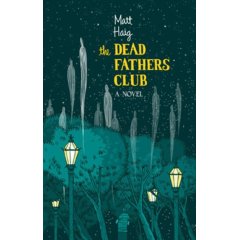
From Booklist
*Starred Review* "What happens when you die? Well, if you're murdered, you become a ghost, as 11-year-old Philip learns when he sees his dead father for the first time at the man's wake. Things start to get sticky when Dad then asks Philip to kill his killer, the boy's oily uncle, Alan, who has designs on both Mum and the family pub, the Castle and Falcon. Uncle Alan, it seems, wants to become king of the Castle in his late brother's stead. Poor bewildered, indecisive Philip. To kill or not to kill--that is the question that comes to haunt him. British author Haig's darkly witty and delightfully clever American debut (his first novel, The Last Family in England, was published in the UK in 2004) is clearly inspired by Shakespeare's Hamlet, and part of the fun for the reader is discovering the many droll and unforced parallels. But the real draw is the extraordinary voice that Haig has created for his first-person narrator. Given to panic attacks, Philip is a breathless storyteller who seldom stops for punctuation but whose honesty and innocence, which shine from every sentence, are utterly captivating and heartbreakingly poignant. The result is an absolutely irresistible read."
Meanwhile, I will be reading at an incredible bookstore" tomorrow night at 7 p.m. (and I'm not a bit scared--at least,not yet.) If anyone is near Porter Square Books in Cambridge, please stop by!
Now for my humble request: If anyone has read The Liar's Diary, and would like to put up a short review on Amazon or B & N, I would much appreciate it.
Saturday, February 03, 2007
IT'S THE THIRD DAY!
Secret Smile by Nicci French deals with a couple of fascinating themes: sexual obsession, and the isolation experienced by victims.
Miranda Cotton has only been dating Brendan Block a few weeks whens she catches him reading her diary. It's an intrusion that ends the relationship for Miranda. But for Brendan, it's only the beginning.
He insinuates his way into her family, becoming (rather too quickly) engaged to her sister, and (rather too adoringly) welcomed by her parents. When he claims to have been the one who broke up with Miranda, her family takes his word against hers.
It's the beginning of a pattern that ratchets up the tension and frustration for both Miranda and for the reader. Everyone who should believe her when she expresses alarm over Brendan's increasingly disturbing actions, takes his side-- from her parents to her closest friend to the police. When she reveals her fears and concerns to her new boyfriend, he, too, turns against her, seeing them as evidence that she is the one who is obsessed.
The frustration and tension we feel on a protagonist's behalf are good things in a novel. The emotional injustices committed against Miranda kept this reader turning pages late into the night, not only horrified by the interloper's menace, but infuriated by the insensitive family, who worry endlessly about Brendan's needs and feelings, but remain utterly impervious to their daughter's.
However, after the family pays the ultimate price for their blindness, they still refuse to give Miranda--or the reader--the satisfaction of remorse or contrition. Nor do they seem to take any responsibility for the role their unconditional acceptance of Brendan may have played in the tragedy. Instead, both parents and sister disappear from the narrative, as do numerous other characters who seem as if they might be significant, only to be dispatched and never heard from again.
That kind of frustration is less good in a novel. As a reward for buying into the story and enduring the trials of the protagonist along with her, the reader wants and deserves a greater sense of vindication when the facts are revealed.
But what really was lacking in this novel for me was any real sense of who Brendan was and what motivated him. Nor do we see why he's obsessed with Miranda in the first place. Theirs is described as a casual, brief relationship set in a milieu when such relationships are common. What is it about Miranda that makes him refuse to let go? Why is he willing to risk everything, and cause the death of two people, over a brief tryst that didn't work out?
The writing was excellent, and some of the descriptions, particularly of the emotions that Miranda experiences after the tragedy were marvelously visceral. If the couple known as Nicci French had answered--or even addressed-- the pivotal question that lies at the heart of the story, this might have been a first rate novel. Instead, it was simply an entertaining read.
Other Third Day Reviews:
Sharala
Amishlaw
>Becca
Jordan
Friday, February 02, 2007
Can I do it?
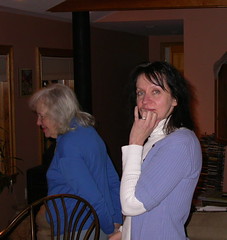
(Photo Ted Lukac)
It's tough to be a mother, and if you think the job is over when your pride and joy grows up and leaves the house--or even when they sprout their first grey hairs, think again.
The photo above, "Can I do it?" shows someone who has endured a crippling lifelong phobia of public speaking, as I contemplate my first reading. And in the background, my mother does the job of mothers everywhere: she worries with me.
Years of failure in speaking publicly passed through my head...the oral reports in school when the paper I held in my hand rattled in time with my banging heartbeat...my wedding, with only 30 of my nearest and dearest in attendance, Ted as cool as a summer melon, and STILL my voice quavered...the times I was invited to speak or read my poetry, when cowardice won and I cancelled at the last moment.
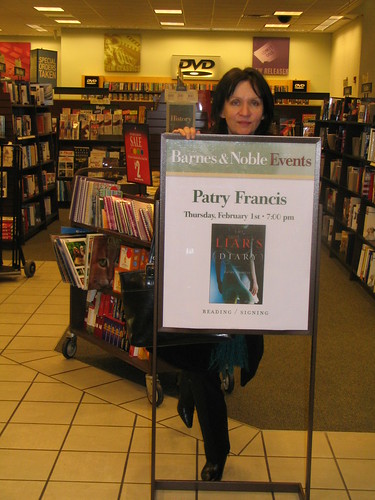
(Photo R. Laban)
But now with the success of my debut novel on the line, could I do it? I paced, fretted and fumed for days. While I stewed, Mom drew patterns on the floor with her own circular pacing. And also like good mothers everywhere, she encouraged: You can, you can, I know you can!
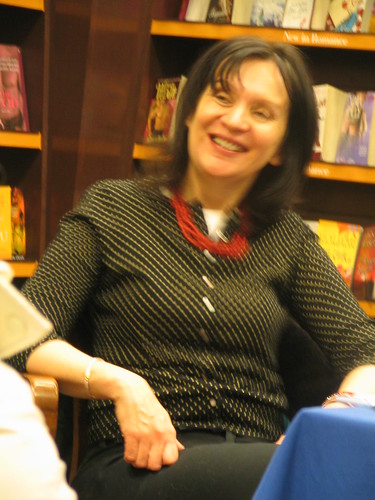
(Photo R. Laban)
And guess what? I could! To a standing room only crowd (okay, this is my hometown and they were nearly all friends and family, but STILL...) I talked OUT LOUD, I read OUT LOUD, and the most amazing part? I wasn't even nervous!
Must've been the presence of my mom smiling in the front row just like she's been all my life. Aren't mothers amazing?

